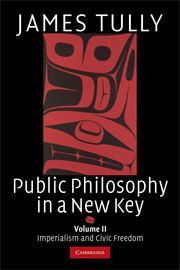Book contents
- Frontmatter
- Contents
- Acknowledgments
- Credits
- INTRODUCTION
- PART 1 GLOBAL GOVERNANCE AND PRACTICES OF FREEDOM
- 1 The Kantian idea of Europe: critical and cosmopolitan perspectives
- 2 Democracy and globalisation: a defeasible sketch
- 3 An ecological ethics for the present
- 4 The unfreedom of the moderns in comparison to their ideals of constitutional democracy
- PART 2 ON IMPERIALISM
- CONCLUSION: CIVIC FREEDOM CONTRA IMPERIALISM
- Bibliography
- Index to Volume II
1 - The Kantian idea of Europe: critical and cosmopolitan perspectives
Published online by Cambridge University Press: 05 September 2012
- Frontmatter
- Contents
- Acknowledgments
- Credits
- INTRODUCTION
- PART 1 GLOBAL GOVERNANCE AND PRACTICES OF FREEDOM
- 1 The Kantian idea of Europe: critical and cosmopolitan perspectives
- 2 Democracy and globalisation: a defeasible sketch
- 3 An ecological ethics for the present
- 4 The unfreedom of the moderns in comparison to their ideals of constitutional democracy
- PART 2 ON IMPERIALISM
- CONCLUSION: CIVIC FREEDOM CONTRA IMPERIALISM
- Bibliography
- Index to Volume II
Summary
INTRODUCTION
This chapter is the first of several criticisms in this volume of the imperial dimensions of the Kantian tradition in International Relations, political theory and practice. It is an immanent critique of what Edward Said called the pervasive ‘cultural imperialism’ of Kant's theory. This line of criticism and anti-imperialism derives from Johann Herder, Frantz Fanon, Edward Said, Charles Taylor and Iris Marion Young. If we take the respect for cultural diversity and democratic freedom seriously, as I argue in favour of in Volume I, then we have to criticise and go beyond the imperial, Eurocentric uniformity of the Kantian framework. My thesis is that a survey of the critical attitude that has developed in response to this tradition over the last two hundred years will change our idea of Europe and its relation to the rest of the world, from a Eurocentric to a more pluralistic conception of cosmopolitanism.
THE KANTIAN IDEA OF EUROPE AND THE WORLD
In The Idea of Europe, Anthony Pagden, Biancamaria Fontana and John Pocock present a wide variety of ideas of Europe from various ages and go on to single out the idea associated with Kant and Constant, suggesting that it remains relevant today. This idea contains five main features. Firstly, Europe is tending towards a federation of independent or sovereign states, each and every one of which has what Kant calls a ‘republican’ constitution: that is, the formal equality of citizens under the law, the separation of legislature and executive, and representative government.
- Type
- Chapter
- Information
- Public Philosophy in a New Key , pp. 15 - 42Publisher: Cambridge University PressPrint publication year: 2008
- 2
- Cited by

